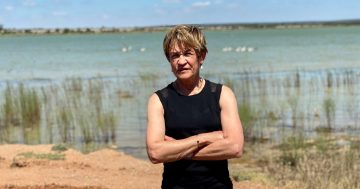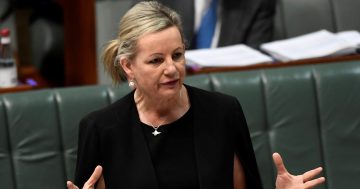
Lachlan Marshall with NSW MPs Helen Dalton (left) and Linda Voltz at his dairy farm in Blighty. Photo: Supplied.
Dairy farmers have warned that the low price of milk in supermarkets combined with the Federal Government’s policy of buying back water from irrigators could be the final nail in the coffin of an industry that’s been in decline for the past two decades.
A recent report by peak body Dairy Australia found that milk production across Australia could plummet by up to 270 million litres if the Federal Government presses on with its plan to step up its so-called water buybacks.
Blighty dairy farmer Lachlan Marshall called the findings “terrible” and “concerning”.
“You’ve got that report there,” he said.
“That says to me, unless something’s done, there’ll be no dairy industry left.
“But Jesus, we’ve been saying that for the last 15 years, and nobody in politics cares.”
The number of dairy farms in the Riverina has decreased from 90 to 19 since the early 2000s, he said.
Mr Marshall thinks if milk prices went up by 10 to 20 cents per litre, the dairy farming industry could be sustained.
“People see them as a very cheap commodity, and unfortunately, the cost of producing them is going up. If the cost of production are going up, the consumer’s got to ultimately wear that. So it has to flow through the supply chain, and those returns need to make it back to the farm gate,” he said.
“And here’s the thing, when consumers find out, they all get afraid, because the cost of food [is] going up.
“It only needs to go up 10 cents a litre. You know, if it went up 20 cents a litre, the dairy industry would be OK.
“So we’re not talking dollars here. We’re not talking amounts of money that break everybody’s piggy banks.
“But the problem is, it doesn’t make it back to the farm gate. The supermarket, the processor in the middle, transport, everything else all take their slice, and we’re lucky to see a fraction of that.”

Helen Dalton is critical of buybacks. Photo: Supplied.
NSW state MP for Murray and irrigation farmer Helen Dalton agrees.
“They’re pushing farmers out,” she said.
“When water is more expensive than milk in the supermarket, there’s a problem, isn’t it?”
Mrs Dalton said water buybacks impacted dairy more than other irrigation industries, explaining water entitlements were classified as either general or high security.
General security water is used for annual crops that complete their entire life in a year, while high security water is used for perennial crops that last for more than two years.
She argues that cattle are “living structures” and should be considered high security. However, they’re currently considered general security, and farmers in Murray were not allocated any water for three successive years “because of mismanagement”.
“With the exception of last year, when they did get a fair bit of water,” she said.
“So it’s really important that water is affordable and available, and [the government] and the [Murray Darling Basin Authority] are making up rules which limit the availability of general security water.”
She said limiting water allocations was putting unnecessary pressure on farmers by restricting how much milk they produced, making businesses unprofitable.
Mr Marshall believes milk prices will remain the same, leaving farmers to bear the cost.
“The supermarkets are selling dairy products as ‘loss leaders’,” he said.
A loss leader is a pricing strategy in which a necessity or popular item (a “leader”) is sold at a price below its market cost to draw customers into a store. The expectation is that consumers will buy other items while they’re inside, and the profit on the other items will cover the loss on the leaders.
“And that’s the problem. Our dairy products are devalued in the marketplace,” Mr Marshall said.
With dairy production plummeting, Australia may have to turn elsewhere to meet market demands.
“We’re exporting, obviously, some niche, high-end dairy product, and at the same time importing some dairy products.
“We are importing New Zealand cheese in bulk now, and that has been happening for a while.
“They cut it up and they wrap it in Australian branded products. And [I’m] not saying that it’s Australian, but Australian brands that are sold here, and they sell that cheese here.
“So there’s already large amounts of New Zealand cheese coming into Australia.”












